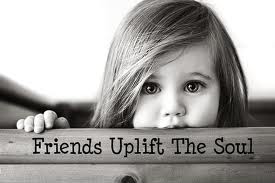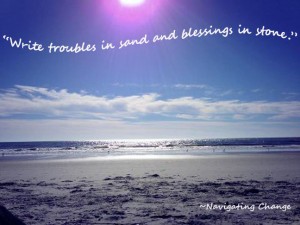And we find at the end of a perfect day,
The soul of a friend we’ve made.
~ Carrie Jacobs Bond
Carmen Berry and Tamar Traeder, in their heartwarming book, Girlfriends, believe that in many ways there are similarities between becoming friends with someone and finding a romantic love. Just as there can be love at first sight, so can a friendship click in a flash… Other friendships grow and show themselves in time, similar to finding that you are in love with someone you have known a long while. Whatever the circumstances, we all seem to remember that first moment when we recognized a unique bond. There are many ways that we stumble upon a new friend. Read on…
We can discover a friend through instant recognition.
You meet your friend, your face brightens —
you have struck gold.
~Kassia (c. 840)
Think about a time when you met someone and instantly recognized a connection that was strong and almost electric. What did you feel? How did you know that this was going to be a valuable relationship that would significantly impact your life?
Sometimes a person we meet is a mirror of the soul.
The depth of a friendship — how much it means to us…
depends, at least in part, upon how many parts of us a friend sees, shares, and validates.
~Lillian Rubin
Every now and then we may have the good fortune of meeting a person who tugs at our heartstrings and leaves us feeling genuinely understood and appreciated. This is the sort of reciprocal connection where you may anticipate each other’s thoughts and feelings, keenly aware of how they experience the world, just as they are aware of how you experience the world. Such a relationship feels almost like a spiritual blessing, of sorts, and something to place on a pedestal to treasure and protect.
Circumstances can throw two people together.
Life frequently throws us into transitions that create openness to new friendships we might not have if life were moving along smoothly and predictably. Facing unfamiliar circumstances, new expectations, and the loss of former supports can engender a need for someone new to come into our lives. Sometimes, too, a shared and traumatic transition can turn strangers into close friends.
One of my dearest friends is a young woman I worked with for a number of years at an educational institution. We liked each other and had things in common, but were quite different based on age, life experiences, and stages of life. Yet, we shared core values simply because of the career paths we selected and the expectations we had of ourselves as educators and women. Ultimately, circumstances threw us into a position of looking to each other to work through complex problems related to our respective positions. We opted to work collaboratively together to find meaningful solutions to the dilemmas we faced. In the process of working through the challenge of transitioning out of a long-time and familiar work environment we discovered an amazing strength and support that bridged both of us into a better professional context. This is a friendship I truly respect and treasure. It surfaced in my life at exactly the right moment…
Some people simply catch our eye… we sense a confidence… we see a quality of eye contact.
Two may talk together under the same roof for many years,
yet never really meet; and two others at first speech are old friends.
~Mary Catherwood (1899)
We have all observed couples who have shared life for many years, yet they appear to be significantly disconnected, practically strangers. They say little to each other, and may not even look at each other. Do they even care about what the other experiences each day? And, we have also watched with admiration the couples that light up in the company of the other, wondering how such a connection can remain vital after so many years.
One day several years ago I was driving my mini-van and stopped at a traffic light. In the lane to the left of my vehicle was an old Honda complete with two elderly folks who appeared to be a couple. My best guess is that they were in their mid to late 80s. The gentleman was driving. The woman was the passenger. The moment in their relationship that I was privileged to witness was when the man reached over across the gear shift and put his hand gently on the woman’s knee. She lifted her face toward the sky and looked out the window nearest mine with a glowing smile and a twinkle in her eye. It was a beautiful example of a close connection between two people who cared deeply for each other — I assume for many years. Very sweet indeed…
Occasionally we meet someone who we never thought would be our friend.
All strong friendships have their own chemistry, but what is it about those relationships that start out explosively? Did you ever know a bully during your school-age years who you detested? And years later, perhaps at a high school reunion, discovered that this “bully” had somehow turned into a really thoughtful and caring human being… someone you wouldn’t mind keeping in touch with… someone you actually wanted to see again at the next reunion? Miracles do happen sometimes.
Connection based on admiration.
I believe that we are always attracted to what we need most,
an instinct leading us toward the persons who are to open
new vistas in our lives and fill them with new knowledge.
~Helene Iswolski
“Sometimes we choose a friend who mirrors our fantasies, dreams of a self we wish we could be. We are attracted to a new friend who is different from others in our life, who is not the result of some random event or accidental meeting. Rather, this may be the first sign that we are ready to drop the defenses that have inhibited the expression of some part of the self, the first glimmering that some part not yet consciously known is ready to emerge…” Lillian B. Rubin.
We may be choosing a friend because we admire him or her, and yet, in admiration, we are expressing who we would like to become. Perhaps this happens because we are ripe for new growth, and our friend will facilitate that development.
Discovering someone who “gets” us…
What is exciting is not for one person to be stronger than the
other… but for two people to have met their match and
yet they are equally as stubborn, as obstinate, as passionate,
as crazy as the other.
~Barbara Streisand
All of us long to be understood by another. And when we are fortunate enough to stumble across those who do “get” us, who do understand what makes us tick, we have struck gold!
A case of mistaken identity…. Who is this person, really?
How desperately we wish to maintain our trust in those we
love! In the face of everything, we try to find reasons to trust.
Because losing faith is worse than falling out of love.
~Sonia Johnson
The friendships we value most are those that have a natural rhythm of give and take, shared vulnerability that is mutually beneficial to both involved. However, sometimes what may look like a friendship, initially, can turn out to be something else, something out of balance. We find ourselves sadly disappointed, experiencing the sting of betrayal and regret.
Most of us have made this mistake at some point in our lives, thinking we have formed a unique bond with a person, only to be disappointed by something that was just not quite right. The person appeared to be a friend, but wasn’t. Such mistakes hurt terribly, but they can also provide the wisdom to discern true friendship from false.
Opposites attract.
Commonalities? Differences? What brings us together and makes a relationship work? Maybe in some cases we find someone who, rather than insisting on being like us, is simply willing to like us — differences, similarities, warts, and all.
A person who has been there all along…
Sometimes we don’t recognize a friend until we have been circling in each other’s orbit for awhile. There may be no connection between two people until they discover the common thread of their lives. We may feel the pull of a true friend right away, or the tie may be uncovered years later in some unexpected way.
Suggested reading:
Berry, Carmen & Traeder, Tamara. (1995). Girlfriends. Wildcat Canyon Press.
Rubin, Lillian B. (1985). Just Friends: The Role of Friendship in Our Lives. New York: HarperCollins.






